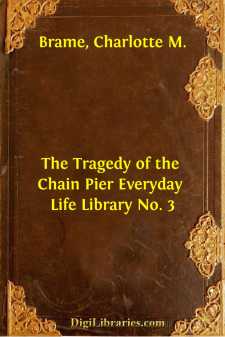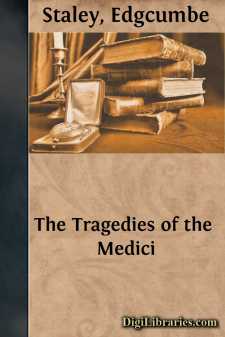Fiction
- Action & Adventure 180
- Biographical 15
- Christian 59
- Classics 6965
- Coming of Age 5
- Contemporary Women 3
- Erotica 8
- Espionage/Intrigue 12
- Fairy Tales, Folklore & Mythology 236
- Family Life 169
- Fantasy 117
- Gay 1
- General 596
- Ghost 32
- Historical 808
- Horror 43
- Humorous 160
- Jewish 25
- Legal 4
- Medical 22
- Mystery & Detective 315
- Political 49
- Psychological 41
- Religious 64
- Romance 159
- Sagas 11
- Science Fiction 730
- Sea Stories 113
- Short Stories (single author) 537
- Sports 10
- Suspense 1
- Technological 8
- Thrillers 2
- Urban Life 31
- Visionary & Metaphysical 1
- War & Military 173
- Westerns 199
Fiction Books
Sort by:
by:
Henry James
I profess a certain vagueness of remembrance in respect to the origin and growth of The Tragic Muse, which appeared in the Atlantic Monthly again, beginning January 1889 and running on, inordinately, several months beyond its proper twelve. If it be ever of interest and profit to put one's finger on the productive germ of a work of art, and if in fact a lucid account of any such work involves that...
more...
PROLOGUE I never met Gabrielle Hewish. I suppose I should really call her by that name, for her marriage took the colour out of it as surely as if she had entered a nunnery, and adopted the frigid and sisterly label of some female saint. Nobody had ever heard of her husband before she married him, and nobody ever heard of Gabrielle afterwards, except those who were acquainted with the story of Arthur...
more...
CHAPTER I. The public may possibly wonder why it is that they have never heard in the papers of the fate of the passengers of the Korosko. In these days of universal press agencies, responsive to the slightest stimulus, it may well seem incredible that an international incident of such importance should remain so long unchronicled. Suffice it that there were very valid reasons, both of a personal and...
more...
CHAPTER I. Most visitors to Brighton prefer the new pier; it is altogether a more magnificent affair. It is in the fashionable town, for fashion will go westward; it is larger, more commodious, more frequented. Go to the West Pier when you will, there is always something to see; beautiful women, pretty girls, fashionable belles promenade incessantly. There are times when it is crowded, and there is...
more...
by:
Mark Twain
CHAPTER 1 вÐâ Pudd'nhead Wins His Name Tell the truth or trumpвÐâbut get the trick.вÐâPudd'nheadWilson's Calendar The scene of this chronicle is the town of Dawson's Landing, on the Missouri side of the Mississippi, half a day's journey, per steamboat, below St. Louis. In 1830 it was a snug collection of modest one- and two-story frame...
more...
by:
Edgcumbe Staley
CHAPTER I LORENZO—"Il Magnifico." GIULIANO—"Il Pensieroso." "Signori!" "Signori!" Such was the stirring cry which resounded through the lofty Council Chamber of the famous Palazzo Vecchio that dull December day in the year 1469. Never had such a title been accorded to any one in Florence, where every man was as good as, if not better than, his neighbour. Foreign...
more...
by:
George MacDonald
PREFACE By this edition of HAMLET I hope to help the student of Shakspere to understand the play—and first of all Hamlet himself, whose spiritual and moral nature are the real material of the tragedy, to which every other interest of the play is subservient. But while mainly attempting, from the words and behaviour Shakspere has given him, to explain the man, I have cast what light I could upon...
more...
by:
Louis Becke
CHAPTER I Brabant's wife was sitting on the shady verandah of her house on the hills overlooking Levuka harbour, and watching a large fore and aft schooner being towed in by two boats, for the wind had died away early in the morning and left the smooth sea to swelter and steam under a sky of brass. The schooner was named the Maritana, and was owned and commanded by Mrs. Brabant's husband,...
more...
by:
Alice Henry
THE TRADE UNION WOMAN I EARLY TRADE UNIONS AMONG WOMEN 1825-1840 The earliest factory employment to engage large numbers of women was the cotton industry of New England, and the mill hands of that day seem to have been entirely native-born Americans. The first power loom was set up in Waltham, Massachusetts, in 1814, and the name of the young woman weaver who operated it was Deborah Skinner. In 1817...
more...
CHAPTER I He was thirty-three, agreeable to look at, equipped with as much culture and intelligence as is tolerated east of Fifth Avenue and west of Madison. He had a couple of elaborate rooms at the Lenox Club, a larger income than seemed to be good for him, and no profession. It follows that he was a pessimist before breakfast. Besides, it's a bad thing for a man at thirty-three to come to the...
more...











